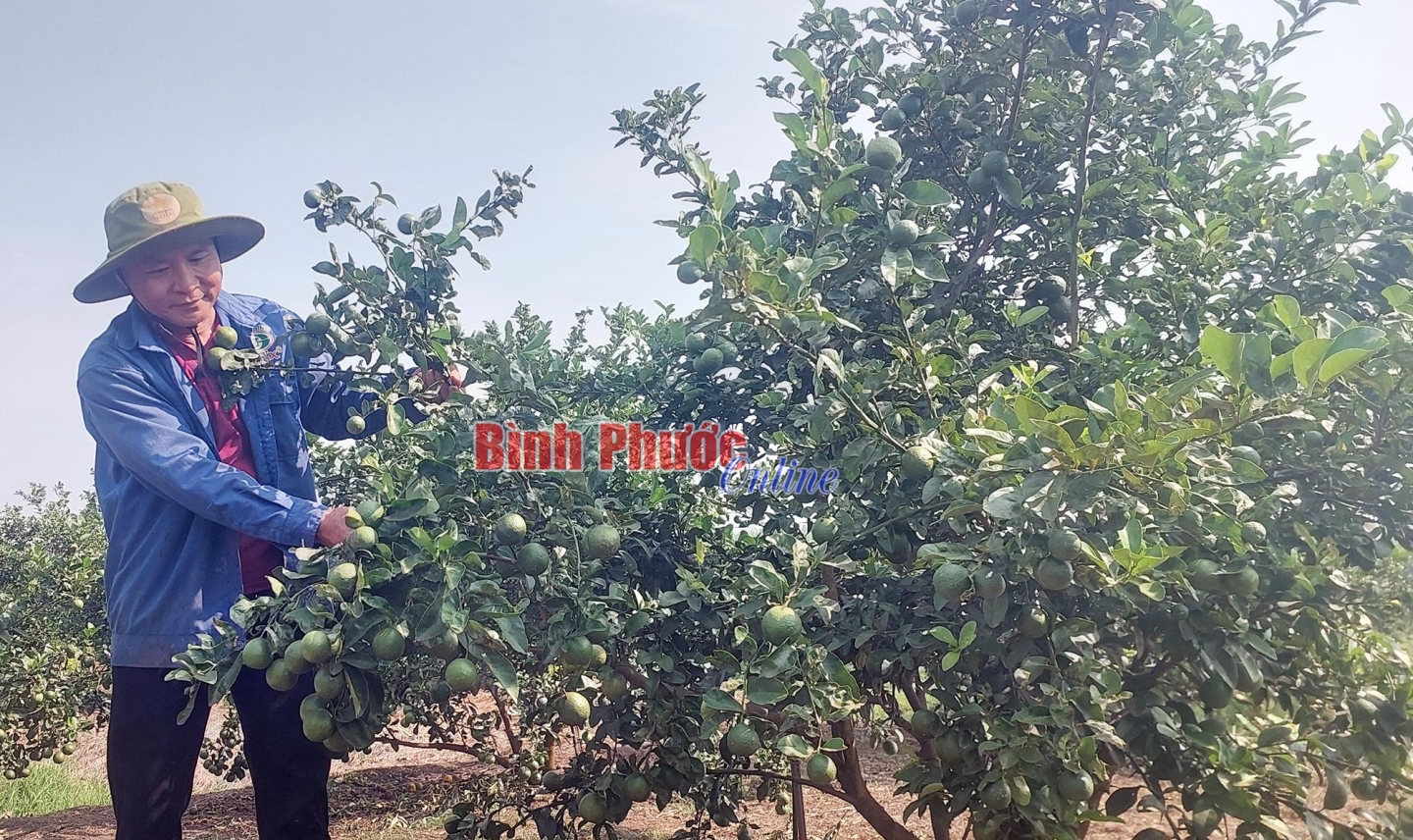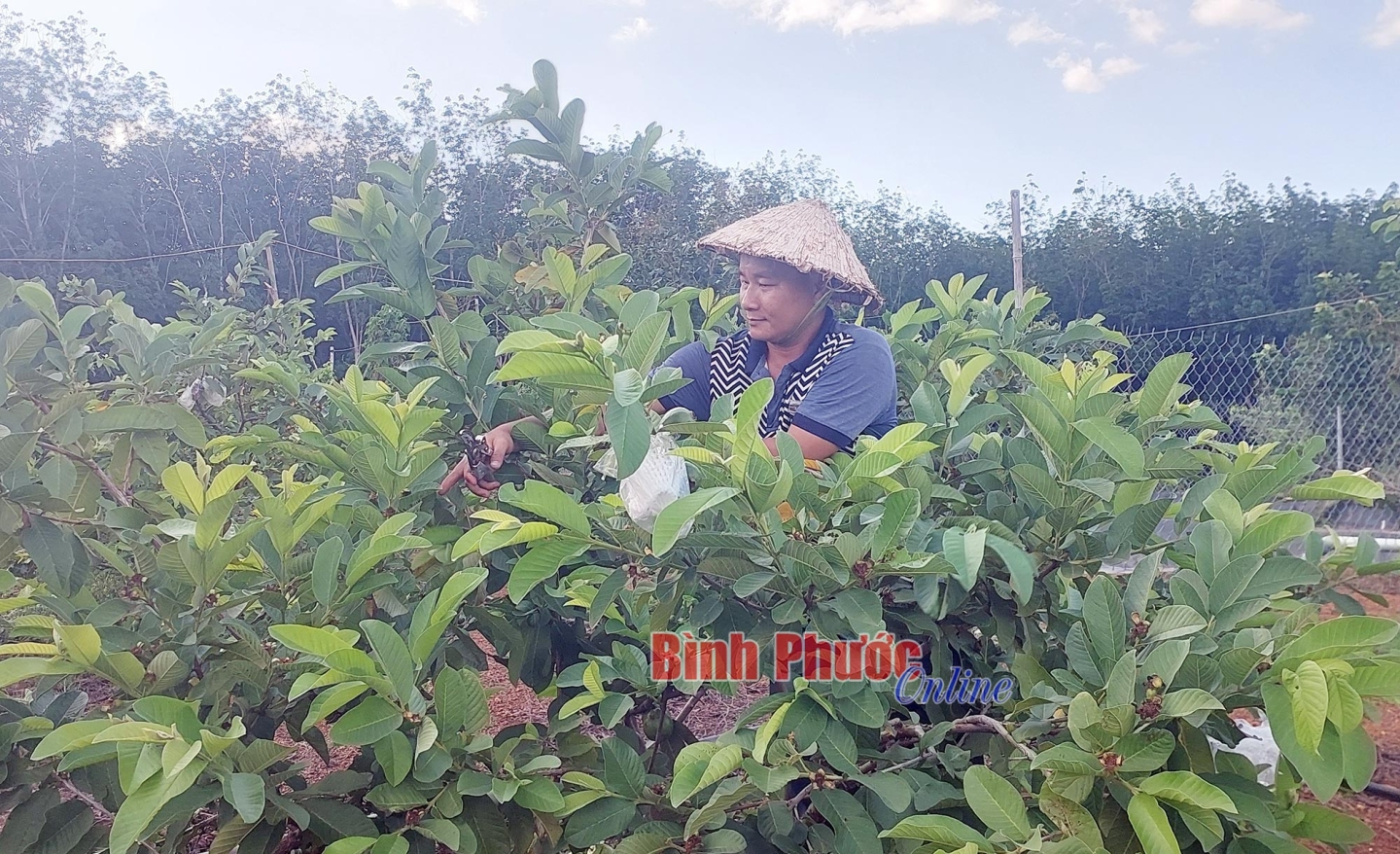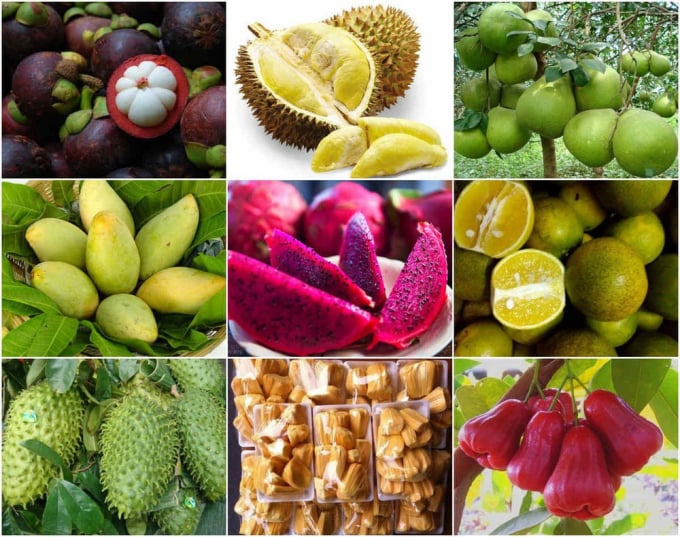Earn billions from four-season lemons
In the dry season, lemons are popular with consumers and sell well. Growing lemons does not require much technique or care, but the economic efficiency is not inferior to other crops. In recent years, Mr. Nguyen Duc Thuan's family in Hamlet 19/5, Duc Hanh Commune, Bu Gia Map District has become rich from this model.
After planting 300 four-season lemon trees on a trial basis, Mr. Thuan found that lemons were suitable for the local soil, grew quickly, and had high yields, so he decided to expand the area from 3 sao to 1 hectare. With a planting distance of 3x3m, Mr. Thuan planted about 1,000 trees/ha. The land for growing lemons was renovated by Mr. Thuan from low-lying areas, and built up in sections. Therefore, the lemons always had enough water to irrigate. The lemon trees were cared for to be healthy, green, and each tree was full of fruit. Mr. Thuan said: “A three-year-old four-season lemon tree will yield about 100kg/year. The average selling price is currently 10-12 thousand VND/kg, 1 hectare will yield about 1 billion VND/year. This is the dream of many farmers”.

According to Mr. Thuan, lemons have some common pests and diseases such as anthracnose, root rot, and mealybugs and yellow spiders. To prevent these pests, farmers can catch them by hand or use biological products to spray all over the tree canopy. Mr. Thuan said: “Preventing pests and diseases is not difficult, because there is a lot of information and documents online, easy to find. The important thing is that farmers must regularly visit the garden, detect and promptly control diseases, and not let them spread and cause harm.”
Like other crops, the larger the lemon tree, the more unsuitable branches need to be removed to create photosynthesis, reduce pests and diseases, and concentrate nutrients on the branches that nourish the fruit. Mr. Thuan regularly prunes the branches, so there are continuously successive batches of fruit, harvested year-round. Mr. Thuan shared that lemon trees are not too picky about soil, but if the pH is adjusted and cared for organically, the tree will have a long life. "In the dry season, I often hoe the soil, dry the soil, and combine lime to adjust the appropriate pH. Each time I apply lime, I add organic fertilizer to ensure balanced nutrition, so that the roots of the lemon tree can absorb well to nourish the tree and fruit" - Mr. Thuan said.
Currently, Mr. Thuan's family earns millions of dong every day from the lemon garden. Easy consumption, along with stable selling prices, makes him feel satisfied with this economic model.
“Healthy living” from Taiwanese guava
Although he only has more than 1 hectare of land on a high hill, Mr. Truong Cong Tuan Anh in Hamlet 2, Dong Tam Commune, Dong Phu District has planted 180 Taiwanese guava trees among rows of Thai rambutan. The number of trees is not much, but guava is a source of daily income, helping him to reinvest. Mr. Tuan Anh said that Taiwanese guava has strong vitality, can withstand arid and harsh weather. Therefore, when cared for with adequate nutrition and techniques, the tree will quickly yield a harvest with very high productivity. "I have only been growing guava for 21 months, and have harvested 5 crops so far. The most recent crop yielded about 2 tons of fruit, retailed on the market for 15,000 VND/kg, earning about 30 million VND" - Mr. Tuan Anh shared.

At all times, Mr. Tuan Anh's guava garden has both young and ripe fruits and clusters of pure white flowers. The successive generations of flowers and fruits create batches of fruit with moderate yields, thereby allowing the gardener to continuously have ripe guavas to harvest and supply the market. This result is thanks to the method of letting the trees bear fruit in cycles, which Mr. Tuan Anh believes is suitable for farmers in market conditions with many potential price fluctuations.
“There are two reasons to choose to grow fruit in cycles. The guava branches will take turns growing flowers and fruits in each stage. Therefore, the tree will have time to accumulate nutrients and rest. The branches will not be exhausted due to having to concentrate on growing fruits simultaneously. With this method, the guava garden will always have fruits with moderate yield, easy to sell, no fear of backlog. In case of low prices, there is no fear of heavy losses” - Mr. Tuan Anh said.
According to Mr. Tuan Anh, growing fruit trees with high productivity must go hand in hand with quality; the form and design must be beautiful to be competitive in the market. In the dry season in Binh Phuoc , there is a lot of sun, if there is no protection, the guava skin is easily sunburned. Therefore, after researching and learning from many places, he used old guava leaves to line the foam bag or specialized bag to cover the fruit, to reduce the heat from the sun. Although this is laborious, it is highly effective in preventing sunburn, the guava fruit also ripens evenly, and avoids harmful insects.
With a passion for agriculture , especially growing guava, Mr. Tuan Anh invested in a well, installed a sprinkler irrigation system around the garden, built a floating tank, and lined it with tarpaulin to store rainwater so that the garden does not lack water. The entire garden is cared for by him with chicken manure, and biological pest control methods are used. Therefore, although Binh Phuoc is in the dry season, the garden is on high ground with lots of gravel and rocks, each guava garden is still full of life.
Source: https://baobinhphuoc.com.vn/news/4/170979/thu-nhap-cao-tu-dien-tich-nho







































Comment (0)